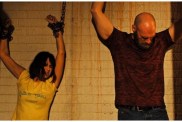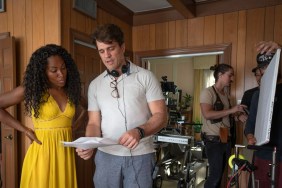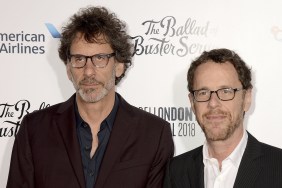Day 2 at the Toronto Film Festival hit the ground running with two eagerly anticipated films, one being the latest from the prolific Coen Brothers, the other being the third film from a director whose surname has become synonymous with the festival, second generation local boy made good, Jason Reitman. For whatever reason, both movies deal with soul searching and finding answers to life’s tough questions, but the approaches are so incredibly different. (If you missed Day 1, you can read that here.)
The Coen Brothers’ A Serious Man (Focus Features) is quite clever and witty, although it takes some time before the pieces start coming together and one realizes the brilliance of their latest effort.
It’s the late ’60s, the summer of love, and in a small Minnesota suburb, physics professor Lawrence Gopnik (Michael Stuhlbarg) is not having a good time. He’s up for tenure soon, but a student has been bribing him for a passing grade, while his family life is falling apart. His son Danny, mere days away from his Bar Mitzvah, is being sought by the school bully for money, his jobless brother Arthur (Richard Kind) has been sleeping on the couch and he just learned that his wife (Sarri Lennick) wants a divorce so she can be with widower Sy Ableman (Fred Melamed). With all these situations escalating out of control, Larry is out of his depth, so he meets with a series of progressively more experienced Rabbis to try to get answers, many which leave him more puzzled about what to do.
With an enigmatic opening involving a husband and wife arguing whether a visiting Rabbi is a “dybbuk” or ghost, A Serious Man sets itself up as one of the Coens’ odder outings, though from the moment we meet Larry and his son Danny, watching them at work, school and home, we realize how well the Coens understand suburban Jewish lifestyle during the late ’60s, presumably from personal experience. Even more than in their previous period pieces, they perfectly capture the times, not just by having a Jefferson Airplane song resurface throughout, but also with smaller things that are harder to put one’s finger on even having had had similar experiences. Some things don’t ring true like the overuse of the “F”-word, which seemed out of place for the time, but as always, the writing is otherwise impeccable.
This is clearly the Coens taking a more personal approach to comedy, keeping even the most dramatic moments being punctuated with laughs. Most of them don’t come necessarily from written jokes as much as from recurring visual gags used over and over again to build repetition so when things are changed up, you don’t see them coming. It also relies heavily on the silent mannerisms of the characters, which makes this the perfect film to showcase the character actors the Coens have always espoused so loyally in their films. This one probably works better for the casting of lesser-known actors with the only familiar faces being Richard Kind as Larry’s troubled brother, Michael Lerner and a couple others. In this sort of environment, theater actor Michael Stuhlbarg thrives as Larry, an everyman who you immediately like without having the baggage that would have come with a better-known actor we’ve seen in dozens of prior films. There are lots of pleasant surprises among the rest of the cast including Sari Lennick as Larry’s wife and Fred Melamed as Sy Abelman, the new man in Larry’s wife’s life who constantly wants to “hug it out” with his competition. At one point, one wonders whether we’ll actually see Uncle Arthur or just hear Kind’s distinctive voice from the bathroom where he’s constantly “draining his cyst” but his physical appearance is very different, as he’s constantly slumped over in despair. As much misfortune that seems to be coming Larry’s way, his brother Arthur hasn’t had nearly as much luck and his problems seem to be getting worse just as Larry’s life falls apart.
At times, one wonders if the movie is meant as some sort of indictment of the philosophical nature of Judaism, which gives Rabbis the freedom to give seemingly nonsensical advice to their flock, similar to the random thoughts hippies might share while smoking marijuana. There may be some concern that Goys who see this movie might immediately see it as an excuse to declare, “Let’s laugh at the Jews!” because so much of the humor comes out of those aforementioned mannerisms that come with the heritage.
Throughout the film, the recurring phrase we keep hearing is “But I didn’t do anything” and that’s just the nature of the movie that you can just be living your life as normal and something devastating might happen and then just as suddenly, things will be back to normal. In that sense, the movie is saying that as much as life throws problems your way, these things always tend to work out, and that’s a great feeling to have as you exit the movie theater. Either way, it’s extremely clever, another piece of truly original fiction storytelling from the Coens, once against showing their brilliance at delivering subtle realism while keeping audiences entertained.

Jason Reitman’s Up in the Air (Paramount Pictures) came into Toronto with an unbelievable amount of hype behind it from the Telluride Film Festival, so much in fact that no possible movie could ever live up to it. And yet it did.
You wouldn’t think that a movie about a man whose job involves flying to different cities firing people would be something that could relate to mass audiences, because very few people experience life quite like George Clooney’s Ryan Bingham. With a home office in Omaha, Nebraska–a home where he spends only a few weeks a year–Bingham’s job is essentially the opposite of a corporate headhunter, letting people go from their jobs in a nice, professional way that avoids the normal histrionics. Though it is somewhat clinical, he does this in person, but his company has begun to think seriously about cutting costs by incorporating an internet-based system devised by 23-year-old Cornell Grad, Natalie Keaner. Ryan’s completely against this new system, because it will essentially end the plane-hopping lifestyle he’s grown accustomed to. He’s also met his perfect female counterpart in Vera Farmiga’s Alex, who is also always on the road and seems ready and willing to throw herself into a casual sexual relationship. To prove Natalie wrong, Ryan is forced to take her into the field with him, completely throwing off his routine.
Much like Clooney’s other movie at the fest (The Men Who Stare at Goats, which we reviewed in Day 1), Up in the Air could be seen as a buddy road comedy, only this one takes place in the air and his traveling companion is almost his polar opposite. Anna Kendrick’s Natalie tries to be all business, but at her core, she’s still an optimistic young woman who sees herself getting married and having kids, plans that fall apart.
One can immediately see connections to Reitman’s previous two movies, as Bingham is cut from the same cloth as Aaron Eckhart’s Nick Naylor and there’s a similar honesty to the relationships as in Juno, but this is a far more mature film in the way it deals with things in a more direct, grown-up way, including the fear of losing one’s job, something that’s extremely timely and relevant to the country’s current economic climate. Even without having read Walter Kirn’s novel, one can tell that, like Thank You for Smoking, the strength of the movie isn’t just in the central premise or the characters but the way Reitman has filtered them through his own sensibilities.
Clooney is just terrific for this, playing a character that’s as complex as Michael Clayton, one who does not lead the life of an ordinary everyman, and yet one that charms us into rooting for him even if we don’t agree with his lifestyle. Few people if any travel nearly as much as Bingham does, but it’s hard not to relate to the need for routine that drives Ryan’s life and the sudden realization that his laissez faire attitude about always being alone really has left him lonely.
There’s no question that the camera absolutely adores Vera Farmiga, and she gives another solid performance that confirms she’s on her way to being this generation’s Streep. Similar praise can be doled on Anna Kendrick, who has taken the promise of her breakthrough performance in Rocket Science to another level when paired with Clooney and Reitman.
Reitman’s production values have also improved greatly even though most of the film takes place in airports, airplanes or offices. Each city shown in the film is set-up with a fantastic high-angle aerial shot, and there are many beautiful images of the skies and clouds, which help to set the mood. Adding to the warmth of the pic is Reitman’s impeccable taste in selecting esoteric versions of known tunes to help set the tone, as does the score by Rolfe Kent (who also did Clooney’s other movie at the fest, The Men Who Stare at Goats). In fact, the entire movie is consistently funny, warm and moving and to his credit, Reitman quickly puts on the brakes when the film seems to be heading towards a predictable Hollywood moment, instead hitting you in the gut with the unexpected.
Very few first-time filmmakers have successfully surpassed their breakthrough films, not when they’re as good as Thank You for Smoking. Reitman has now done that twice, and Up in the Air shows the very growth and evolution that proves this is a filmmaker who will be with us, making quality films that leave us deeply moved, for a very long time.

To adapt Robert E. Howard’s lesser-known sword and sorcery hero Solomon Kane would probably have been a difficult task for any filmmaker, let alone one who has never done anything quite so big or epic, but Michael Bassett jumps in head first and ends up waist-deep as he tries to capture the tone and feel of the warrior-turned-preacher fighting injustice in the dangerous forests of 17th Century England.
First, we get a prologue showing the prior incarnation of Solomon Kane, a fierce warrior killing for gold and money without thought of consequences, he ends up being the last man standing on one such pillaging mission, left alone to accept the devil’s claim on his soul. The story then jumps forward after Kane has spent a year in a monastery trying to find redemption by renouncing the violence that previously comprised his lifestyle. He meets a family of pilgrims making the journey to America but they fall afoul of a group of vicious bandits who have become the henchmen of the demonic “Malakai” and his masked warrior.
The results are an impressive looking film on a reasonably limited budget, technically spectacular in terms of production design, cinematography and its epic score. Storywise, it leaves a lot to be desired, because it has many tonal and pacing problems, mainly because like the source material, it’s all handled very seriously.
Much of that comes down to the fact that Bassett has filled the cast with strong dramatic actors who tend to hold the film’s gravitas. James Purefoy isn’t bad as Kane, but he definitely turns it up a few too many notches as he barks out his lines and keeps things very serious, which makes it difficult to warm up to him as a character. In fact, you’re apt to feel absolutely no emotional connection to him or the family he’s sworn to protect whatsoever, which is a problem, a BIG problem. It’s also a problem that the decently-choreographed action scenes seem to be scarce, allowing the movie to regularly get bogged down in exposition and all-around overacting. The film should build up to a spectacular ending but instead goes in a way that’s fairly expected and predictable, which is somewhat disappointing.
Possibly diehard fans of Howard’s anti-hero might appreciate the effort by Bassett, as might those who can appreciate a movie merely for its FX eye candy. Even so, Roy Thomas’ comic books remain the best introduction to the character while this film is a decent though unspectacular companion piece at best.
The main casualty of Day 2 was Tony Jaa’s action sequel Ong Bak 2: The Beginning (Magnolia), which started half an hour late and by then, we were already too tired and hungry to concentrate on the Thai subtitles. Hopefully, we’ll catch this later in the festival or back in New York.
Day 3 was another big day including Terry Gilliam’s The Imaginarium of Dr. Parnassus (Sony Pictures Classics), followed by the period horror flick Dorian Gray, John Hillcoat’s The Road (Dimension Films), and then we had a couple movies from first-time filmmakers. Fingers crossed we’ll have a recap of that soon.









